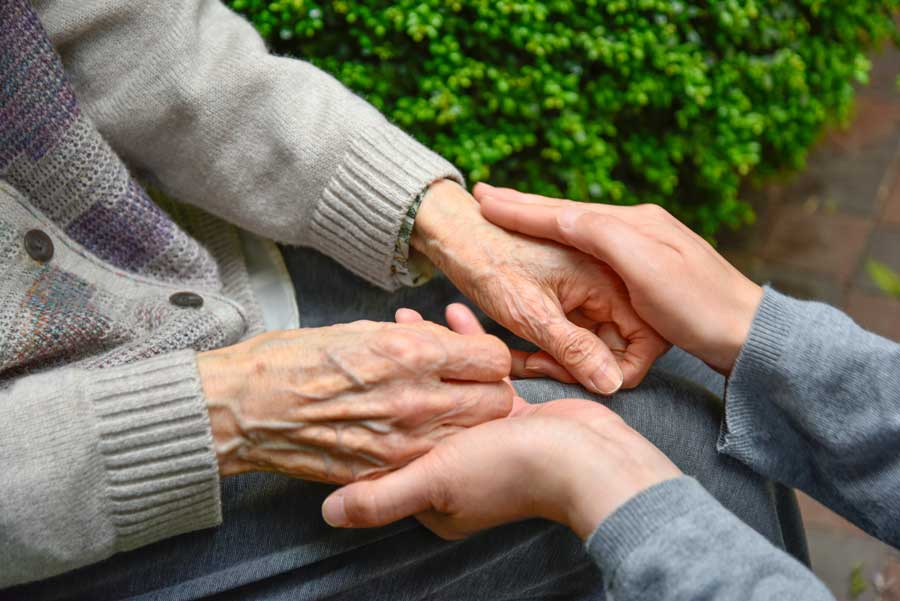Maha was unwinding from the morning rush—legs stretched out on the couch, coffee mug in hand—when she got the email from her bank.
“Heads-up: You have $0.00 left in your BMO account—”
What in the world?
Maha sat up straight, her eyes glued to her phone. No! Her hands began to shake, and her breath came out in gasps. How could this happen? All her savings! Had she been scammed?
“Mohamed! Come quick!”
Her husband’s eyes widened as he read from the screen she held out. “It must be your dad!”
Oh no. She closed her eyes. I should have seen this coming. Her father had Alzheimer’s, and he’d been raving for weeks about how they were all stealing money from him. He must have gone to the bank and closed all the accounts under his name—the ones he helped each of his children open decades ago.
 Watching parents age is always hard. But when they experience the cognitive decline associated with dementia, the difficulties they and their loved ones face is a whole other ballgame. Recognizing that this is a test for all involved parties—and a means of purification for us if we are patient—can help us process the prolonged grief that comes with seeing the gradual disappearance of the person we once knew.
Watching parents age is always hard. But when they experience the cognitive decline associated with dementia, the difficulties they and their loved ones face is a whole other ballgame. Recognizing that this is a test for all involved parties—and a means of purification for us if we are patient—can help us process the prolonged grief that comes with seeing the gradual disappearance of the person we once knew.
In the Qur’an, we are reminded that decline due to old age is a natural process, and this reminder should allow us to reflect on our weakness in comparison to Allah’s perfection: “Allah has created you, and then causes you to die. And some of you are left to reach the most feeble age so that they know nothing after having known much. Indeed, Allah is All-Knowing, Most Capable” (16:70).
With regards to our parents, Allah commands us to treat them with kindness. In the Qur’an, this command often directly follows the command to worship Allah alone. One of the most well-known verses conveying this idea highlights the stage when our parents are elderly—perhaps because this is the most challenging time. In this verse, we are warned against even saying “uff,” an Arabic exclamation that conveys frustration or annoyance:
“For your Lord has decreed that you worship none but Him. And honor your parents. If one or both of them reach old age in your care, never say to them ‘uff’ nor repel them. Rather, speak to them a noble word. And lower to them the wing of humility out of mercy, and pray, ‘My Lord! Be merciful to them as they raised me when I was small’” (17:23-24).
What is Dementia?
Dementia is an umbrella term for several diseases that affect memory, thinking, and the ability to perform daily activities. Its most common cause is Alzheimer’s, a degenerative brain disease, but dementia can also result from brain injuries or diseases like Parkinson’s or multiple sclerosis.
Regardless of which disease is the culprit, all dementia is caused by abnormal brain changes. These changes trigger a decline in thinking abilities severe enough to impair daily life and independent function. It also affects emotions, behaviors, and, as a result, relationships.
This is not a rare condition; according to the World Health Organization, more than 55 million people worldwide are living with dementia, and there are 10 million new cases every year.
Signs and Symptoms
How do we know that a loved one is developing dementia? Keep an eye out for these early signs and symptoms:
- forgetting things or recent events
- losing or misplacing things
- getting lost when walking or driving
- being confused, even in familiar places
- losing track of time
- difficulties solving problems or making decisions
- problems following conversations or trouble finding words
- difficulties performing familiar tasks
- visually misjudging distances to objects
Other signs relate to changes in mood and behavior, which can sometimes precede memory problems. Here are some of these changes:
- anxiety and/or depression
- getting easily upset or angry
- aggressive or threatening behaviors
- compulsive or repetitive behaviors
- apathy
- withdrawal from work or social activities
Dementia affects each person differently, depending upon the underlying causes, other health conditions, and the person’s cognitive functioning before becoming ill. However, most symptoms worsen over time. Eventually, most people with dementia will need others to help with daily activities and personal care.
Practical Matters
As our parents age, important discussions are needed about a host of practical matters. And when the parent is deteriorating cognitively, that discussion needs to happen sooner rather than later. The two main areas of discussion are finances and health care.
In terms of finances, here are some issues to be aware of:
-
- Bill payment—People showing signs of dementia will soon be unable to keep track of their bills. They may end up being charged exorbitant fees for unpaid bills and even face legal action. Plan ahead by enabling automatic payments whenever possible. Also, assign someone in the family to be responsible for checking all mail that the parent receives.
- Power of Attorney—It’s essential for a trusted family member to have a power of attorney (POA). This is a legal document that authorizes a designated person to make decisions about another person’s finances, property, or medical care. Make sure that the affected parent signs a power of attorney well in advance of further deterioration, so that their wishes are made clear and so that the document will be legally valid. (Note: banks typically require their own internal POA document, so having a general POA may not help with actions related to the parent’s bank account.)
- Bank accounts—The affected parent should consider adding a trusted family member to their bank account, so that that person can authorize transactions on their behalf if they become incapable of doing so.
- Will—This is an essential document for every North American Muslim to prepare, regardless of age or health condition, to ensure that inheritance is distributed according to Islamic law.
In terms of health-related matters, here are some issues to consider:
-
- Location—Having social support and multiple caregivers is very important, as it’s very difficult for one family member to take full responsibility for a person with dementia. It’s a good idea for parents to live in close proximity to their children so that the children can more easily assist them.
- Living will—This is a legal document that specifies the wishes of the ill person with regards to end-of-life care. These are difficult but important discussions to have.
- Power of attorney—A POA that is specific to health matters can also be helpful, so that there is a designated person responsible for making health care decisions for the affected parent when they are no longer able to do so.
Concluding Advice

For those just beginning to tread this difficult path, hearing from those who’ve already walked it can be helpful. Yusra has plenty of advice to share from the hard lessons she’s learned. Her father lived alone and prided himself on his independence, but in his 70s, he began to forget important dates and passwords. He’d also misplace valuables and then call police to report them stolen. Until Yusra contacted his doctor to request an assessment and he was diagnosed with dementia, he didn’t admit that he needed help.
“He began forgetting how to do very basic things like banking and cooking and how to use his computer,” says Yusra. “I kept him independent for a couple of years, where I had him in a supportive environment with meals delivered and caregivers checking in. But eventually he had to move to a nursing home for his own protection.”
Here is some of Yusra’s advice:
-
- Appreciation: “Appreciate your parents while you have them.”
- Avoiding isolation: Help your parent maintain social connections. To those experiencing early symptoms of dementia, she advises, “Never cut yourself off from others. Have trusted people who know things about you. Write a power of attorney in advance and a living will to help with your care and decision making.”
- Difficult conversations: “Talk about difficult things with your parent. Talk to their doctor. Start the process to help them before it gets worse. Don’t wait.”
- Trust: “Trust is very important, and with my father that was the one thing I really felt like I needed to maintain.” People with dementia often become suspicious of even their closest family members, so being transparent when helping them with their finances will help appease their anxiety.
- Familiarity: “Keep their lives familiar to them. Same stores, same house, same neighborhood, same people as much as possible so that they can retain as much as they can. My father recognizes me and tells me I remind him of his daughter. So, I see him daily to keep reminding him who I am. I am his comfort and I don’t want him to lose that.”
Witnessing a parent’s decline due to dementia is a heartbreaking experience. However, it’s also an opportunity to demonstrate faith and exercise patience, as demonstrated in these Qur’anic verses:
“And We will surely test you with something of fear and hunger and a loss of wealth and lives and fruits, but give good tidings to the patient. Who, when disaster strikes them, say, ‘Indeed we belong to Allah, and indeed to Him we will return.’ Those are the ones upon whom are blessings from their Lord and mercy. And it is those who are the [rightly] guided” (2:155-157).
May Allah shower us all—parents with dementia and their children who strive to serve them—with His blessings, mercy, and forgiveness.
Note: Names have been changed to protect privacy.





